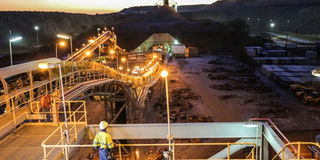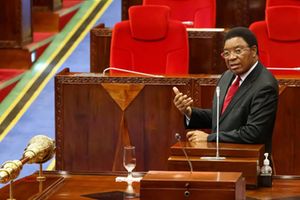Court of Appeal reduces compensation for Nyamwaga family to Sh150 million in case against African Barrick Gold Mine

What you need to know:
- Previously, the High Court of the Mwanza Region had directed the manager to pay the family of six Sh50 million each for the harm caused by the mine's activities near their residence.
Dar es Salaam. The Court of Appeal has reduced the amount of money that the Chacha Kiguha family of Nyamwaga Village in Tarime district was supposed to be compensated by African Barrick Gold Mine Ltd (ABG) to Sh150 million from the Sh300 million.
Previously, the High Court of the Mwanza Region had directed the manager to pay the family of six Sh50 million each for the harm caused by the mine's activities near their residence.
The decision arose from a lawsuit filed by members of the Chacha family, including Chacha himself, his wife Neema, and their children Bhoke and Kiguha, represented by their father, along with Motongori and Surati, represented by their mother.
In an appeal lodged by the general manager of African Barrick Gold Mine Ltd (ABG), the Court of Appeal reduced the compensation from Sh50 million to Sh25 million per family member.
The ruling, issued by justices Agustine Mwarija (presiding), Abraham Mwampashi, and Zainabu Muruke on June 14, 2024, was published on the court's website on June 24, 2024.
In the original case, the family claimed that the company had failed in its duty of care, resulting in respiratory, ear, and skin ailments due to mine emissions, explosions, and dust.
As a result of these illnesses, Chacha and his wife claimed loss of income as they were unable to engage in economic activities. They requested the court to order compensation totaling Sh600 million for all six family members.
In a judgment delivered by Judge Lameck Mlacha on August 3, 2016, the High Court accepted their claims and evidence, ruling that the defendant had a duty to ensure the plaintiffs were not harmed by the mine's activities, which it failed to fulfill.
The court ordered the family to receive a total damages compensation of Sh300 million, amounting to Sh50 million each, and also mandated payment of seven percent interest per annum from the date of the judgment until the completion of all payments.
The ABG manager was dissatisfied with the judgment and appealed to the Court of Appeal, challenging both the ruling and the compensation award, citing nine grounds for appeal.
In its verdict, the Court of Appeal stated that there was no direct evidence proving that the respiratory, ear, and skin conditions claimed by the family were caused by the mine's operations.
Instead, the court acknowledged that the only proven harm suffered by the family due to the mine's activities was disturbance.
In determining whether the health issues suffered by the family were caused by the mine, the court considered the testimony of two expert witnesses from both sides.
Dr Nego Nyakeboko, former District Medical Officer (DMO) of Tarime, testified for the plaintiffs, having treated the family between 2012 and 2013.
Dr Nicholas Mboya, a defense witness, reviewed the medical records and noted that the specific illnesses claimed were not documented, suggesting that claims of respiratory issues caused by mine smoke were not substantiated.
Based on this evidence, the court concluded that the evidence presented was insufficient to link the claimed health issues directly to the mine's activities.
The court, however, acknowledged that the mine's operations, particularly the dust and noise from explosive activities near the plaintiffs' residence, had caused them discomfort.
"There is no dispute that the defendant's operations were affected by noise, and it is clear that the mining activities caused dust which, due to the proximity of the mine and the residence of the respondent, caused them discomfort," said the Court of Appeal.
"Therefore, although the respondent's claims that the mine's activities caused illnesses were not proven, the court finds that these activities caused discomfort, hence the appellant is responsible for compensating them for the overall damage," the court said.
The court also found Chacha negligent in contributing to the discomfort by building near a licensed mining area.
"The rule is that where negligence contributes to the damage on one side, the amount of compensation for the overall damage to that side should be reduced depending on the extent of its negligence contribution," the court said.
"Recognizing the nature of the damages suffered by the first respondent and his family, and considering the extent of his negligence contribution, we believe that compensation of Sh25 million for the appellant's responsibility will satisfy the case," the court said.
"Therefore, the appellant is ordered to pay a total of Sh150 million plus seven percent interest per year from the date of the initial court judgment until the date of completion of all award payments," the judgment said.
During the appeal hearing, the appellant was represented by lawyers Faustin Malongo and Carolina Kivuyo. The respondents represented themselves without a lawyer.
The case arose from a dispute over land compensation between Chacha and the management of Barrick Company.
The company was granted a Special Mining License (LMM) in five villages in Tarime district, Mara region, including Nyamwaga Village, where Chacha and his family reside.
In an evaluation conducted by the company for landowners affected by the license, Chacha refused to accept a compensation of Sh1.7 million, as he did not believe he could find another area for that amount.
Therefore, Chacha decided to build a house and live in the disputed area where the company continued its mining operations.





